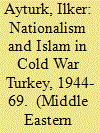| Srl | Item |
| 1 |
ID:
108642


|
|
|
|
|
| Publication |
2011.
|
| Summary/Abstract |
Turkish-Israeli relations, which had reached the level of strategic cooperation by the end of the 1990s, started to decline after 2000 and Turkey's approach to Israel has changed considerably as a result of huge transformations in international, regional, and Turkish domestic politics. The Israeli Operation Cast Lead in December 2008-January 2009 and the "One Minute" incident at Davos in January 2009, however, initiated a continuous crisis situation, which reached its peak in the May-June 2010 Mavi Marmara crisis. This article aims to analyze the causes of change in the Turkish perception of Israel by focusing on three key factors: Justice and Development Party ideology and actors, power vacuum in the Middle East, and Turkish foreign policy discourse of grandeur.
|
|
|
|
|
|
|
|
|
|
|
|
|
|
|
|
| 2 |
ID:
133526


|
|
|
|
|
| Publication |
2014.
|
| Summary/Abstract |
Our current knowledge on the history of Turkish nationalism during the Cold War is a blend of facts and myths. One of those myths is the argument that the Turks developed a special relationship with Islam following their massive conversion in the eleventh century to the extent that religion has become the most important ingredient in Turkish national identity over time, even more pronounced than ethnic attributes. Secular visions of Turkish nationalism, on the other hand, which emphasize ethnic characteristics, are generally regarded as curious but unimportant exceptions. This article challenges that narrative and maintains that the alleged unimportance of secular nationalism is an invention of the late 1960s. It provides evidence that there was no consensus among Turkish nationalists on the question of Islam; on the contrary, the role of Islam in the making of Turkish identity was the most hotly debated topic among rival nationalist circles. It was not until the turning point in 1969 that a host of factors such as demographic change, anti-Kemalist and anti-RPP sentiments, and electoral behaviour in Cold War Turkey convinced Turkish nationalists to adopt a more Islamic-leaning discourse to be more successful at the ballot box.
|
|
|
|
|
|
|
|
|
|
|
|
|
|
|
|
| 3 |
ID:
057756


|
|
|